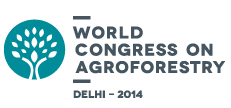Gender matters in agroforestry in dry and degraded lands? An analysis from tribal India
Gender matters in agroforestry in dry and degraded lands? An analysis from tribal India
wca2014-1046 Purabi Bose 1,* 1Decision and Policy Analysis, Internation Center for Tropical Agriculture (CIAT), Cali, ColombiaThis paper explores the gender dimension of agroforestry in semi-arid (with degraded land) tribal districts of western India. It examines men and women’s participation in agroforestry activities in eight tribal villages that are devoid of basic infrastructure such as electricity, and piped drinking water supply. The agroforestry programme was introduced by local non-governmental organization parallel to promote community forest management. The qualitative method includes key in-depth interviews and focus-group discussion to collect data related to who owns land, how men and women participate in decision-making of agroforestry activities, and who (and why) controls the collection and marketing of the resources. The findings indicate that agroforestry in dry and degraded land has high value at household level. The majority of land is owned (or claimed) by men. The access rights to the land differ between men and women – women tend to have more access to resources. In the study villages, tribal men make decisions regarding the marketing while the decisions related to planting and fodder productions are done by women. Men tend to ‘participate’ more in the meetings, but women are in-charge regarding improving the soil quality, and adaptive to agroforestry related innovations to tackle droughts in the region. Further the focus groups discussion indicated that in terms of establishing networks within the villages compared to men it is women who are actively involved in communication and exchanging ideas. The gendered difference in access to land and trees and other products of agro-forestry largely impacts on benefit-sharing within households. Overall, the findings of this ethnographic research highlights that semi-arid and degraded lands makes it important for both men and women to play an active role in implementing agroforestry activities.

